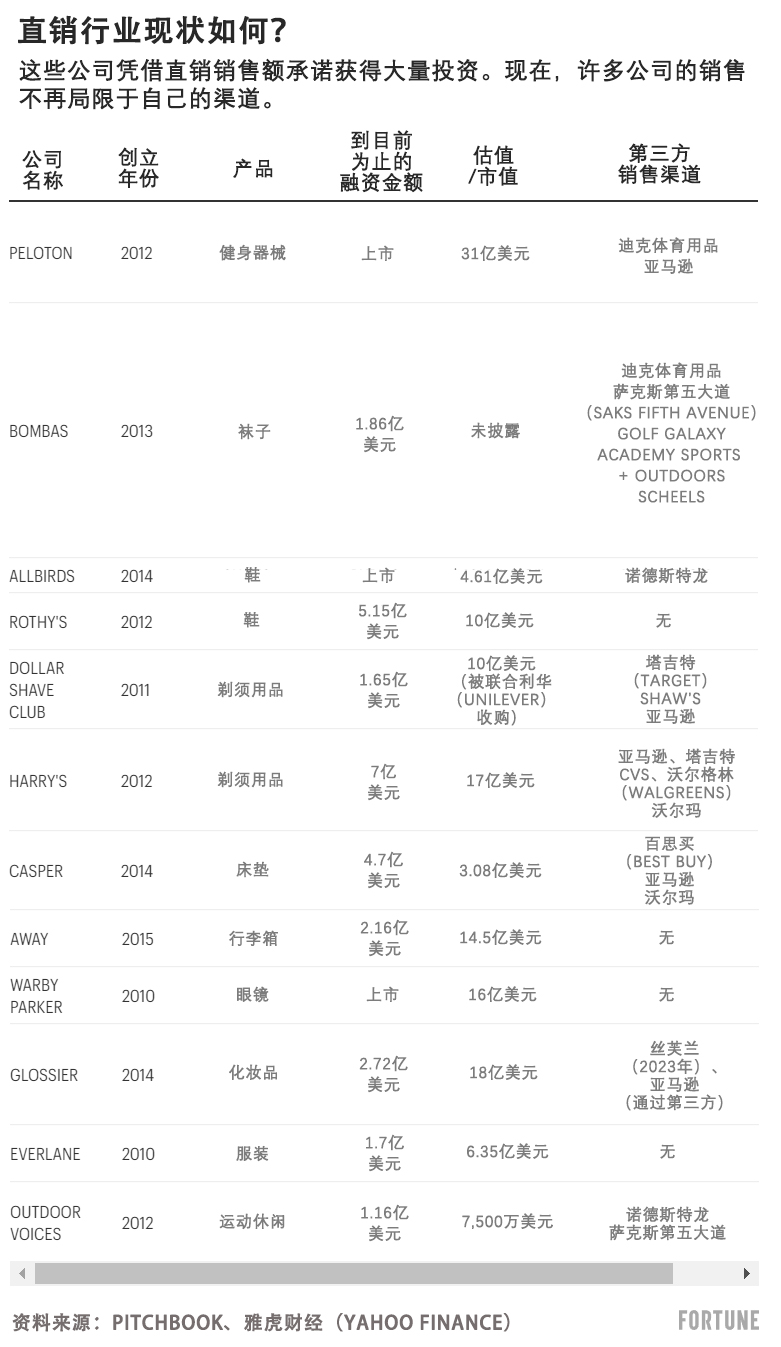
风险投资公司Forerunner投资了过去十年诞生的多个知名度最高的品牌,包括行李箱制造商Away、化妆品公司Glossier和高端狗粮供应商Farmer’s Dog。所谓直销(DTC)品牌通过有针对性的社交媒体策略,可以绕过大型零售商,直接对接买家,因此颇受追捧。
但如果你问Forerunner的合伙人妮可·约翰逊现在想投资哪类公司,直销初创公司的排名绝对靠后。事实上,她表示她不会投资采用纯直销策略的公司。
约翰逊说:“直销模式曾经是创新和零售的前沿,或者本身很有趣,但这已经是整整十年前的事情了。”她表示,现在直销渠道只是一个对年轻消费者品牌有用的“筹码”而已,它本身不再是一种商业模式。
这种观点得到了《财富》杂志采访的多位风险投资者的认同,体现了改变了互联网格局的重要变化,以及在经济不确定时期私营企业投资者心态的转变。如果说直销初创公司曾经被认为是零售业革命的先驱,那么目前在风险投资者眼中,它们就已经成为一个不同时期的遗物。
Headline的创始合伙人马赛厄斯·希林称:“他们轻轻松松就能够募集到大量资金。”Headline的早期基金投资了智能音箱Sonos、时装公司Anine Bing和宠物食品公司Nom Nom等许多消费者品牌。希林表示,该公司现在将只投资采用不可取代技术的消费品公司。“随着广告行业的整合,直销变得越来越难。”
即便是早期标志性的直销品牌,似乎也对直销的效果越来越缺乏信心。高端动感单车品牌Peloton曾经要求买家直接从公司订购,然后由公司工作人员送货上门,如今在亚马逊(Amazon)和迪克体育用品(Dick’s Sporting Goods)都可以买到。
Peloton遭遇了一连串的战略性失误和管理决策错误。但其最近开始与第三方零售商合作的做法,在知名直销品牌中变得日益常见。Glossier最近宣布,将从2023年起在丝芙兰(Sephora)店铺销售商品,潮鞋品牌Allbirds于2022年5月宣布其产品开始在诺德斯特龙(Nordstrom)超市出售。
早期风险投资公司Lerer Hippeau投资了Prose、Warby Parker和Parade等公司。该公司的合伙人凯特琳·斯特兰德贝格表示,她不会再投资没有亚马逊或者沃尔玛(Walmart)销售策略的零售公司。她指出,人们在浏览亚马逊时会产生购物的冲动,这不同于刷Instagram。
斯特兰德贝格说:“你可以在全网提高品牌知名度,但如果你想登陆人们购物的平台,比如越来越多人购物的亚马逊,你九会期待人们在亚马逊上搜索你的品牌名称,你希望自己的品牌出现在搜索结果当中。”虽然一些直销模式的开拓者依旧坚持这种策略,例如眼镜公司Warby Parker ,但它们正在成为少数派(参见下图)。
苹果(Apple)的iPhone手机系统更新正在挤压直销业务的生存空间
在社交媒体平台上的获客成本增加,也是变化的驱动因素之一。随着Facebook和Snapchat等平台在广告业中的影响力与日俱增,与许多直销公司初创的2011年和2012年相比,在这些平台上的营销成本大幅增加。

Noise的创始人乔·拉斯卡表示,最近苹果公司修改隐私政策,增加了社交媒体营销的难度。Noise是一家拥有12名员工的营销机构,曾经与坎耶·维斯特和苏打水品牌Poppi等客户有过合作。拉斯卡称,自从苹果调整政策以来,通过Facebook和Instagram广告获客的成本平均上涨了20%至30%。
这是因为苹果的新版iPhone手机软件,使营销商很难跟踪用户在线上的行为,然后精准推送社交媒体信息。比如,如果你之前计划为即将开始的旅行购买太阳镜或者凉鞋,它们就不会再突然出现在你满是度假信息的Instagram信息流当中,除非你同意广告商跟踪你的在线行为。
为了将社交媒体用户转变成产品购买者,直销品牌现在需要广撒网,结果推高了获客成本。
运动休闲品牌Outdoor Voices的创始人泰·哈尼表示:“直销商品一直是直接向消费者出售,而谷歌、Facebook、Instagram等平台就像是数字世界里的房东。”
34岁的哈尼言简意赅地总结了许多人对直销零售的态度发生的转变。毕业于帕森斯设计学院(Parsons School of Design)的哈尼在2012年创立了Outdoor Voices,公司标志性的行动起来(#doingthings)标签在Instagram上被引用了约200,000次。即使在苹果调整隐私政策之前,Outdoor Voices的业务已经有出现问题的苗头。据《纽约时报》(New York Times)报道,该公司在2018年亏损1,900万美元,尽管净收入翻了一番达到3,800万美元。
哈尼在2020年因为与董事会产生分歧离开公司。她对《财富》杂志表示,Outdoor Voices将30%至40%的资金用于在Facebook、Instagram和谷歌等平台上销售。
她目前专注于自己创立的利用区块链技术的TYB.XYZ平台。该平台将人们购买的商品,例如苹果形状的大麻研磨机等,与非同质化代币(NFT)和社区会员相匹配。哈尼称,公司的理念是利用加密货币和区块链技术,与消费者建立真正的直接联系。
她表示,加密货币为品牌商“开创了一种更好的商业模式”,不必再依赖广告平台。
如果哈尼是正确的,那么直销模式或许并不会消失,而是正在进行升级。(财富中文网)
译者:刘进龙
审校:汪皓
风险投资公司Forerunner投资了过去十年诞生的多个知名度最高的品牌,包括行李箱制造商Away、化妆品公司Glossier和高端狗粮供应商Farmer’s Dog。所谓直销(DTC)品牌通过有针对性的社交媒体策略,可以绕过大型零售商,直接对接买家,因此颇受追捧。
但如果你问Forerunner的合伙人妮可·约翰逊现在想投资哪类公司,直销初创公司的排名绝对靠后。事实上,她表示她不会投资采用纯直销策略的公司。
约翰逊说:“直销模式曾经是创新和零售的前沿,或者本身很有趣,但这已经是整整十年前的事情了。”她表示,现在直销渠道只是一个对年轻消费者品牌有用的“筹码”而已,它本身不再是一种商业模式。
这种观点得到了《财富》杂志采访的多位风险投资者的认同,体现了改变了互联网格局的重要变化,以及在经济不确定时期私营企业投资者心态的转变。如果说直销初创公司曾经被认为是零售业革命的先驱,那么目前在风险投资者眼中,它们就已经成为一个不同时期的遗物。
Headline的创始合伙人马赛厄斯·希林称:“他们轻轻松松就能够募集到大量资金。”Headline的早期基金投资了智能音箱Sonos、时装公司Anine Bing和宠物食品公司Nom Nom等许多消费者品牌。希林表示,该公司现在将只投资采用不可取代技术的消费品公司。“随着广告行业的整合,直销变得越来越难。”
即便是早期标志性的直销品牌,似乎也对直销的效果越来越缺乏信心。高端动感单车品牌Peloton曾经要求买家直接从公司订购,然后由公司工作人员送货上门,如今在亚马逊(Amazon)和迪克体育用品(Dick’s Sporting Goods)都可以买到。
Peloton遭遇了一连串的战略性失误和管理决策错误。但其最近开始与第三方零售商合作的做法,在知名直销品牌中变得日益常见。Glossier最近宣布,将从2023年起在丝芙兰(Sephora)店铺销售商品,潮鞋品牌Allbirds于2022年5月宣布其产品开始在诺德斯特龙(Nordstrom)超市出售。
早期风险投资公司Lerer Hippeau投资了Prose、Warby Parker和Parade等公司。该公司的合伙人凯特琳·斯特兰德贝格表示,她不会再投资没有亚马逊或者沃尔玛(Walmart)销售策略的零售公司。她指出,人们在浏览亚马逊时会产生购物的冲动,这不同于刷Instagram。
斯特兰德贝格说:“你可以在全网提高品牌知名度,但如果你想登陆人们购物的平台,比如越来越多人购物的亚马逊,你九会期待人们在亚马逊上搜索你的品牌名称,你希望自己的品牌出现在搜索结果当中。”虽然一些直销模式的开拓者依旧坚持这种策略,例如眼镜公司Warby Parker ,但它们正在成为少数派(参见下图)。
苹果(Apple)的iPhone手机系统更新正在挤压直销业务的生存空间
在社交媒体平台上的获客成本增加,也是变化的驱动因素之一。随着Facebook和Snapchat等平台在广告业中的影响力与日俱增,与许多直销公司初创的2011年和2012年相比,在这些平台上的营销成本大幅增加。
Noise的创始人乔·拉斯卡表示,最近苹果公司修改隐私政策,增加了社交媒体营销的难度。Noise是一家拥有12名员工的营销机构,曾经与坎耶·维斯特和苏打水品牌Poppi等客户有过合作。拉斯卡称,自从苹果调整政策以来,通过Facebook和Instagram广告获客的成本平均上涨了20%至30%。
这是因为苹果的新版iPhone手机软件,使营销商很难跟踪用户在线上的行为,然后精准推送社交媒体信息。比如,如果你之前计划为即将开始的旅行购买太阳镜或者凉鞋,它们就不会再突然出现在你满是度假信息的Instagram信息流当中,除非你同意广告商跟踪你的在线行为。
为了将社交媒体用户转变成产品购买者,直销品牌现在需要广撒网,结果推高了获客成本。
运动休闲品牌Outdoor Voices的创始人泰·哈尼表示:“直销商品一直是直接向消费者出售,而谷歌、Facebook、Instagram等平台就像是数字世界里的房东。”
34岁的哈尼言简意赅地总结了许多人对直销零售的态度发生的转变。毕业于帕森斯设计学院(Parsons School of Design)的哈尼在2012年创立了Outdoor Voices,公司标志性的行动起来(#doingthings)标签在Instagram上被引用了约200,000次。即使在苹果调整隐私政策之前,Outdoor Voices的业务已经有出现问题的苗头。据《纽约时报》(New York Times)报道,该公司在2018年亏损1,900万美元,尽管净收入翻了一番达到3,800万美元。
哈尼在2020年因为与董事会产生分歧离开公司。她对《财富》杂志表示,Outdoor Voices将30%至40%的资金用于在Facebook、Instagram和谷歌等平台上销售。
她目前专注于自己创立的利用区块链技术的TYB.XYZ平台。该平台将人们购买的商品,例如苹果形状的大麻研磨机等,与非同质化代币(NFT)和社区会员相匹配。哈尼称,公司的理念是利用加密货币和区块链技术,与消费者建立真正的直接联系。
她表示,加密货币为品牌商“开创了一种更好的商业模式”,不必再依赖广告平台。
如果哈尼是正确的,那么直销模式或许并不会消失,而是正在进行升级。(财富中文网)
译者:刘进龙
审校:汪皓
Venture capital firm Forerunner has funded some of the most recognizable brands to emerge over the past decade, including luggage maker Away, cosmetics company Glossier, and high-end dog chow purveyor Farmer’s Dog. The so-called direct-to-consumer (DTC) brands gained huge followings by reaching buyers directly through targeted social media tactics, bypassing the big retailers.
But if you ask Forerunner partner Nicole Johnson what kind of businesses she’s looking to invest in today, direct-to-consumer startups are not very high on the list. In fact, she says she would not invest in a company pursuing a purely DTC strategy.
“We’re a whole decade past where pursuing the DTC model was at the forefront of innovation and retail, or was interesting on its own,” Johnson says. A direct-to-consumer sales channel is just “table stakes” today, she says—a useful feature for a young consumer brand, but not a business model in its own right.
It’s a sentiment echoed by numerous VC investors that Fortune spoke to, reflecting significant changes that have altered the internet landscape, as well as the shifting mindset among private company investors at a time of economic uncertainty. If direct-to-consumer startups were once touted as the harbingers of a retail revolution, today they are viewed by VCs as relics of a different era.
“They raised way too much money way too easily,” says Mathias Schilling, a founding partner at Headline whose early-stage fund has backed smart speaker Sonos, fashion company Anine Bing, and pet food company Nom Nom, among many other consumer brands. Today, Schilling says, the firm will back only consumer-companies that utilize irreplicable tech. “Now with the consolidation of advertising, it’s incredibly hard.”
Even some of the early standard-bearers of DTC seem less convinced about its powers. Peloton, whose high-end stationary bikes once required buyers to order directly from the company and await home delivery from Peloton staffers, is now available for purchase on Amazon as well as Dick’s Sporting Goods.
Peloton has struggled amid its own string of strategic blunders and management decisions. But its newfound embrace of third-party retailers is increasingly common among DTC top brands. Glossier recently announced a deal to begin selling its products in Sephora stores starting in 2023, and hip sneaker maker Allbirds announced a May 2022 deal to sell its shoes at Nordstrom department stores.
Caitlin Strandberg, a partner at early-stage venture firm Lerer Hippeau, which has funded companies like Prose, Warby Parker, and Parade, says that she would no longer invest in a retail company that doesn’t have an Amazon or Walmart playbook. When people browse Amazon, they intend to buy, unlike when they scroll through Instagram, she says.
“You can build brand awareness across the web, but if you’re going to be where people buy—people are buying more and more on Amazon—you can expect they’ll search your brand name on Amazon, and you want to be on that search page,” says Strandberg. While some DTC pioneers like eyeglasses company Warby Parker are sticking to the direct strategy, they are increasingly in the minority (see chart).
Apple’s iPhone update is squeezing DTC businesses
The rising cost of acquiring customers on social media platforms is also driving the change. As platforms like Facebook and Snapchat have become bigger players in the ad industry, the cost of marketing on the platforms has risen sharply from the levels in 2011 and 2012, when many of the DTC companies were getting started.
Joe Laresca, the founder of a Noise, a 12-person marketing agency that has worked with clients like Kanye West and soda brand Poppi, says recent privacy changes rolled out by Apple have made social media marketing even tougher. The costs to acquire customers on Facebook and Instagram ads have risen on average by 20% to 30% since the change, says Laresca.
That’s because Apple’s new iPhone software makes it tougher for marketers to follow users around the web and then fill their social feeds with highly targeted pitches. The sunglasses or sandals you previously contemplated buying for an upcoming trip, for example, will no longer suddenly appear in your vacation-laden Instagram feed, unless you’ve consented to being tracked by advertisers.
To convert social media users into buyers of their products, direct-to-consumer brands now need to cast a wider net, driving up customer acquisition costs.
“Direct-to-consumer has been sold to us as direct, where actually Google, Facebook, Instagram, etc. are just the digital landlords,” says Ty Haney, the founder of athleisure company Outdoor Voices.
Haney, now 34, epitomizes the change of heart that many feel toward direct-to-consumer retail. The Parsons School of Design graduate launched Outdoor Voices in 2012, saturating Instagram some 200,000 times with the company’s signature #doingthings hashtag. Even before the Apple privacy changes, there were signs of trouble in Outdoor Voices’ business. According to a New York Times report, the company lost $19 million in 2018, even as net revenue doubled to $38 million.
Haney, who left the company in 2020 after a dispute with the board, told Fortune that Outdoor Voices spent 30% to 40% of its funding to sell on platforms like Facebook, Instagram, and Google.
Today she’s focused on TYB.XYZ, a marketplace she started that leverages blockchain technology. The market pairs purchases of goods like an apple-shaped marijuana grinder with an NFT and community membership. The idea, Haney says, is to use crypto and blockchain technology to create a truly direct relationship with customers.
Crypto, she says, “unlocks a better business model” for brands that would otherwise have to rely on ad platforms.
If Haney is right, perhaps DTC isn’t dead after all, it’s just getting an upgrade.






